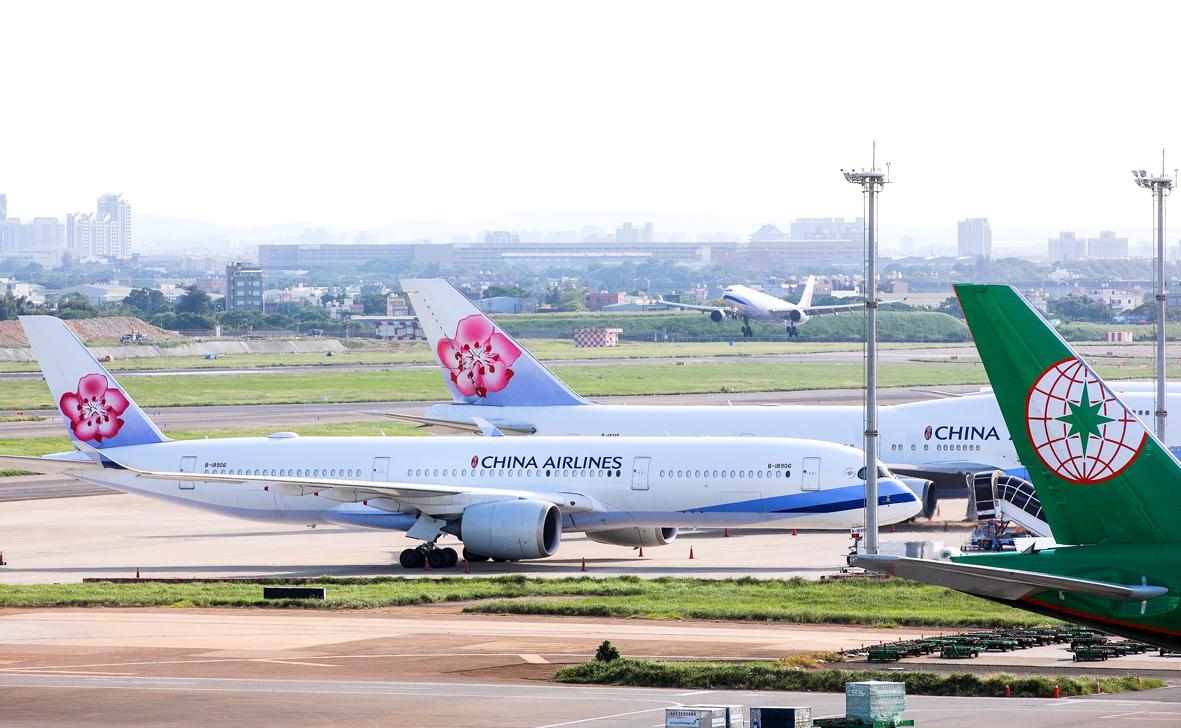China Airlines Ltd (CAL, 中華航空) and EVA Airways Corp (長榮航空) yesterday said that they are ready and willing to transport COVID-19 vaccines, although they had not received assignments from the government.
The airlines’ remarks came after a report by the Chinese-language Liberty Times (the Taipei Times’ sister paper) said that the Central Epidemic Command Center (CECC) had asked EVA to install liquid nitrogen storage to facilitate carrying vaccines developed by Pfizer Inc and BioNTech, which must be kept at about minus-75°C.
EVA said that it did not receive an assignment from the CECC, but it has told the Civil Aeronautics Administration that it would be happy to provide a door-to-door vaccine delivery service.

Photo: Bloomberg
“We are confident that we can handle Pfizer’s ultra-cold vaccines with our cold-chain delivery service,” EVA said in a statement.
Although EVA has not previously shipped goods kept at such a low temperature, such an assignment would be doable with ultra-cold freezers or dry ice, it said, adding that it has many years of experience shipping flu vaccines.
EVA, which has five Boeing Co 777 cargo aircraft and has ordered three new 777F cargo aircraft, said that it could use its passenger jets’ cabins to ship vaccines if necessary.
Several freight forwarders have approached CAL to discuss transportation of vaccines and the negotiations are still ongoing, it said in a statement.
CAL has not received an assignment from the government, but it is confident about its temperature-controlled delivery service launched in 2013, the airline said.
CAL said that it is the only Taiwanese carrier to have been awarded Center of Excellence for Independent Validators certification from the International Air Transport Association.
Whether the two airlines are capable of transporting COVID-19 vaccines has been in the spotlight, as some Taiwanese biotech firms are also working on vaccines after products developed by Pfizer-BioNTech and Moderna Inc showed high effectiveness.
The CECC has not assigned deliveries to EVA, as it is still in the process of purchasing vaccines through the COVAX global vaccine alliance, Centers for Disease Control Deputy Director-General Chuang Jen-hsiang (莊人祥), the CECC’s spokesman, told a news conference in Taipei earlier yesterday.
It might be the foreign vaccine makers that decide which airlines are to transport their products, with specific requirements for storage and logistics, not the CECC, Chuang said.
As transporting COVID-19 vaccines takes special care and equipment, the government might prefer to let the vaccine makers handle distribution, even if the costs are higher, a market analyst said by telephone.

GROWING OWINGS: While Luxembourg and China swapped the top three spots, the US continued to be the largest exposure for Taiwan for the 41st consecutive quarter The US remained the largest debtor nation to Taiwan’s banking sector for the 41st consecutive quarter at the end of September, after local banks’ exposure to the US market rose more than 2 percent from three months earlier, the central bank said. Exposure to the US increased to US$198.896 billion, up US$4.026 billion, or 2.07 percent, from US$194.87 billion in the previous quarter, data released by the central bank showed on Friday. Of the increase, about US$1.4 billion came from banks’ investments in securitized products and interbank loans in the US, while another US$2.6 billion stemmed from trust assets, including mutual funds,

AI TALENT: No financial details were released about the deal, in which top Groq executives, including its CEO, would join Nvidia to help advance the technology Nvidia Corp has agreed to a licensing deal with artificial intelligence (AI) start-up Groq, furthering its investments in companies connected to the AI boom and gaining the right to add a new type of technology to its products. The world’s largest publicly traded company has paid for the right to use Groq’s technology and is to integrate its chip design into future products. Some of the start-up’s executives are leaving to join Nvidia to help with that effort, the companies said. Groq would continue as an independent company with a new chief executive, it said on Wednesday in a post on its Web

JOINT EFFORTS: MediaTek would partner with Denso to develop custom chips to support the car-part specialist company’s driver-assist systems in an expanding market MediaTek Inc (聯發科), the world’s largest mobile phone chip designer, yesterday said it is working closely with Japan’s Denso Corp to build a custom automotive system-on-chip (SoC) solution tailored for advanced driver-assistance systems and cockpit systems, adding another customer to its new application-specific IC (ASIC) business. This effort merges Denso’s automotive-grade safety expertise and deep vehicle integration with MediaTek’s technologies cultivated through the development of Media- Tek’s Dimensity AX, leveraging efficient, high-performance SoCs and artificial intelligence (AI) capabilities to offer a scalable, production-ready platform for next-generation driver assistance, the company said in a statement yesterday. “Through this collaboration, we are bringing two

Even as the US is embarked on a bitter rivalry with China over the deployment of artificial intelligence (AI), Chinese technology is quietly making inroads into the US market. Despite considerable geopolitical tensions, Chinese open-source AI models are winning over a growing number of programmers and companies in the US. These are different from the closed generative AI models that have become household names — ChatGPT-maker OpenAI or Google’s Gemini — whose inner workings are fiercely protected. In contrast, “open” models offered by many Chinese rivals, from Alibaba (阿里巴巴) to DeepSeek (深度求索), allow programmers to customize parts of the software to suit their